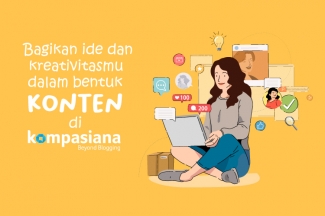Never once I thought that in the beginning of my career in marine affairs, that I get to experience living among the fishers community in Teluk Jakarta. A given opportunity for me to conduct reality check approach-like on coastal livelihood, just ±10 km away from my own house.
I’d say BRING IT ON!
Prior to my arrival, I already prepared myself to face anything that would come along the way. The environment, the people, the house, I whispered to myself to assure that I was just an empty glass, waiting to be fulfilled with new insights and inspiration from my “new home.”
Well.. I think the word “learning” will undervalue the meaning of what I felt processing the countless stuffs I’ve encountered to during my 3 nights stay in Kampung Bambu, Jl. Kalibaru Timur, Kelurahan Kalibaru, Cilincing, Jakarta Utara. In this piece, I will involve the things that I take in from the people of Kampung Bambu and their economic and political system, from the principle and value they stick to, and the most important, their sense of hope in the air.
The people was very nice.
There are more or less 50 households who regularly participate as host family for aspiring guests of live-in program. As the participants are vary, from Jakarta schools’ students to international students, they could express the kindness and gratitude of life for the participants to learn from them. On behalf of “take and give,” the participants could share their life background and making the deeds to make use of themselves and to give back to the families. They are super kind because the moment we arrived at their house, they treat us as family, not even a second they think of us as guests.
- The economic system of Kalibaru people works around the production chain of Green Mussels (Perna viridis) as the main commodity in Kalibaru, even though there are also other occupation as casualties. However, the division of labor in Green Mussels production explain as follows:
- The bosses who own the green mussels farming far from the coast
- The fishers who own boats
- The fishers who acquire the skills to do fishing but disown boats
- The boilers or “perebus” who boil (obviously) kilograms of green mussels taken from the farm
- The peelers or “pengupas” of green mussels
- The takers or “kuli panggul” of green mussels to be taken to Muara Baru or any other market
It is challenging to try grasping the system in just a limited amount of time. I could not meet all of the workers, but I am quite satisfied that I visited the bosses’ place where some of the them (from the bosses to the peelers) do all the production process in one relatively small place. As you can predict, the higher their position are, the more they earned.
I think to myself, it is unfortunate to the fishers who disown boats as they are being dependent to the boat owners, especially because that happened to my host-dad. And to the fishers with lungs health problems because of tire compressor as their diving tools. And to almost every mothers as peelers who spend hours peeling the mussels with a price of IDR 3000/kilograms, sometimes they get knees problems caused by bending legs (to peel) too often. For the mothers, time is indeed money because income is based on how fast their hand and how many mussels they can peel. Those are also unfortunate because none of the existing relations between bosses and workers are permanent.
However, my highest respect to them, specifically on how they view education.
The parents put their hope on their children by encouraging them to pursue education. Had any children go to school, the families have the privilege to obtain Kartu Jakarta Pintar. Unfortunately, the environment and the lack of motivation can be an obstacle for kids to diligently go to school so the alternative aside of formal school, is informal education for children. On this part, I have to mention Red Nose Foundation or “Yayasan Hidung Merah” who implement children education program in the form of social circus for children in Cilincing. The foundation pick social circus as a cognitive approach to make children get used and get motivated to study until the point they voluntarily want to develop their knowledge and skills.
I am personally so proud of my host-brother who finished senior high school by the support of social circus scholarship. Wait, don’t be confused. His skills are literally the ability to do all of the juggling, weighting, dancing, and acrobat in a fun, colorful, and fancy performance of circus. As I am a dancer myself, I was so excited hearing his story, not to mention his success on performing overseas in Myanmar with his group. I was delighted when I had the chance to (awkwardly) practice juggling with him and my host-sister. Those kind of innovative education is really inspiring and ground-breaking.
